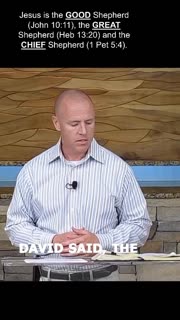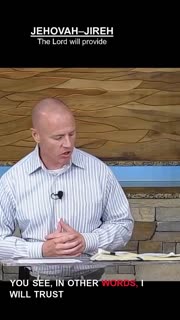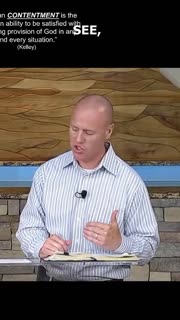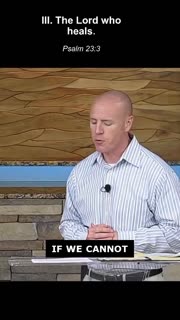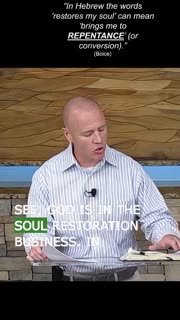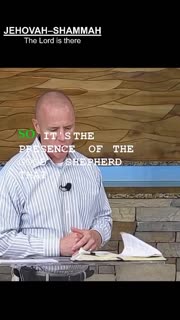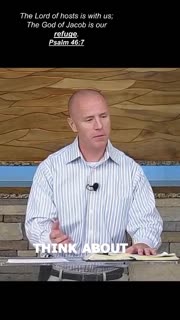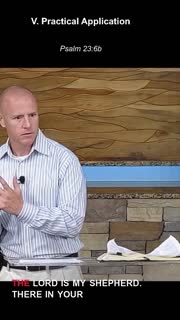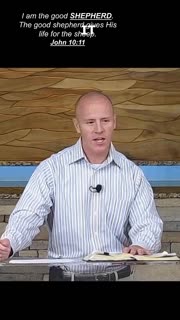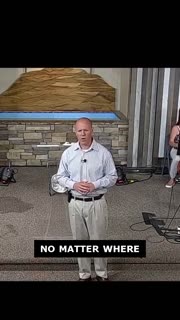Trusting the Good Shepherd: God's Care and Provision
Devotional
Sermon Summary
Bible Study Guide
Sermon Clips
1. "David said, the Lord is my shepherd, and because of that, I shall not want. Now, I can imagine David recalling his days as a shepherd boy and thinking, my sheep never wanted. I took good care of them because he knew what it meant to do that. And he knew what it meant to be taken care of by the Lord. So now he could say to himself, I shall not want. If the Lord is your shepherd, you shall not want." [09:34] (26 seconds)
2. "You see, in other words, I will trust the Lord to provide everything that I need, so I shall not want. I will trust the Lord to provide everything that I need, so I shall not want. I need nothing else. And interestingly enough, we just covered both of these, both meanings from the book of Philippians. The first one, I shall not want because God will provide, we find in Philippians 4.19. My God shall supply all of your need according to his riches and glory by Christ Jesus." [10:51] (26 seconds)
3. "You see, it's all from him, and it's all for him. In the book of Colossians, chapter 1, verse 16, speaking of Jesus, we read this, for by him, all things were created that are in heaven, that are on earth, visible and invisible, whether thrones or dominions or principalities or powers, all things were created through him and for him. So think about it. The sheep were created by the shepherd. For the shepherd. We can't do any of it. It has to be the Lord." [13:53] (34 seconds)
4. "If we cannot find green pastures or still waters, how much more helpless are we with trying to restore our own soul? You know, part of my prayer and preparation for this was simply, I'm not going to do it. I'm going to do it. I'm going to do it. All of us, myself included, that we would recognize our need for a shepherd, that we would relate to a sheep. So maybe you think that you can find the green pastures. Maybe you think you'll pull yourself up by your bootstraps. You'll press on. You'll keep going. You'll be all right. Maybe you think you can find the still waters. But let me ask you this. How will you restore your soul?" [16:59] (37 seconds)
5. "You see, God is in the soul restoration business. In fact, Jesus himself, in what could be described as his mission statement in Luke 19.10, said that he came to seek and to save that which is lost. Only God can restore a soul. And speaking of he restores my soul, Warren Wiersbe references another name for God, there in your notes, which is Jehovah Rapha, the Lord who heals. You see, the Lord can heal both physically and spiritually, but he's the only one that can heal you spiritually." [21:24] (34 seconds)
6. "So it's the presence of the good shepherd that gets us through the valley of the shadow of death. And maybe on a lesser extent of how serious the shadow of death is, maybe it's losing a job or not making a sports team or something along those lines. But maybe it's something serious like losing a loved one or just a financial collapse or your kids going wayward. But whatever the valley is, know that it is God who will bring you peace. He will bring you through it." [25:55] (28 seconds)
7. "Think about this. All throughout scripture, oil is a picture of the Holy Spirit. And the Lord anoints the head of a believer with his Holy Spirit at the moment of salvation. You come to Christ and you're baptized by his Holy Spirit. Instantaneously, you have God living inside of you. But after receiving his Holy Spirit, we're told to walk in the Spirit, to be led by the Spirit, to be filled with or controlled by the Holy Spirit." [29:02] (30 seconds)
8. "The Lord is my shepherd. There in your notes, Spurgeon wrote, the sweetest word of the whole is that monosyllable. David did not say that the Lord is the shepherd of the world at large, but that the Lord was my shepherd, his personal shepherd. Can you say that this morning? You see that God is almighty and all-powerful, but he's also a very personal God. He doesn't take care of his flock from millions of miles away. He's present, personal, and he wants an intimate relationship with his sheep." [32:01] (39 seconds)
9. "And it is him alone that can give you eternal life. But it's him alone that can give you this abundant life. That is life to the fullest, life with a purpose. And it begins at the moment of salvation. It's not often the great by and by. It's right here, right now. But again, my prayer this week was that all of us would recognize that we are sheep and that we need a shepherd. That we would recognize that we are a sinner who needs a savior. And his name is Jesus." [33:38] (31 seconds)
10. "No matter where you are in your walk with Christ, understand that it is him alone that can restore your soul. If you don't know the good shepherd, come to him this morning. If you know him, but you've been roaming around, or perhaps you're a cash sheep, come to him this morning. Come talk with one of us. We would love to pray with you." [35:10] (21 seconds)
Ask a question about this sermon
2. "You see, in other words, I will trust the Lord to provide everything that I need, so I shall not want. I will trust the Lord to provide everything that I need, so I shall not want. I need nothing else. And interestingly enough, we just covered both of these, both meanings from the book of Philippians. The first one, I shall not want because God will provide, we find in Philippians 4.19. My God shall supply all of your need according to his riches and glory by Christ Jesus." [10:51] (26 seconds)
3. "You see, it's all from him, and it's all for him. In the book of Colossians, chapter 1, verse 16, speaking of Jesus, we read this, for by him, all things were created that are in heaven, that are on earth, visible and invisible, whether thrones or dominions or principalities or powers, all things were created through him and for him. So think about it. The sheep were created by the shepherd. For the shepherd. We can't do any of it. It has to be the Lord." [13:53] (34 seconds)
4. "If we cannot find green pastures or still waters, how much more helpless are we with trying to restore our own soul? You know, part of my prayer and preparation for this was simply, I'm not going to do it. I'm going to do it. I'm going to do it. All of us, myself included, that we would recognize our need for a shepherd, that we would relate to a sheep. So maybe you think that you can find the green pastures. Maybe you think you'll pull yourself up by your bootstraps. You'll press on. You'll keep going. You'll be all right. Maybe you think you can find the still waters. But let me ask you this. How will you restore your soul?" [16:59] (37 seconds)
5. "You see, God is in the soul restoration business. In fact, Jesus himself, in what could be described as his mission statement in Luke 19.10, said that he came to seek and to save that which is lost. Only God can restore a soul. And speaking of he restores my soul, Warren Wiersbe references another name for God, there in your notes, which is Jehovah Rapha, the Lord who heals. You see, the Lord can heal both physically and spiritually, but he's the only one that can heal you spiritually." [21:24] (34 seconds)
6. "So it's the presence of the good shepherd that gets us through the valley of the shadow of death. And maybe on a lesser extent of how serious the shadow of death is, maybe it's losing a job or not making a sports team or something along those lines. But maybe it's something serious like losing a loved one or just a financial collapse or your kids going wayward. But whatever the valley is, know that it is God who will bring you peace. He will bring you through it." [25:55] (28 seconds)
7. "Think about this. All throughout scripture, oil is a picture of the Holy Spirit. And the Lord anoints the head of a believer with his Holy Spirit at the moment of salvation. You come to Christ and you're baptized by his Holy Spirit. Instantaneously, you have God living inside of you. But after receiving his Holy Spirit, we're told to walk in the Spirit, to be led by the Spirit, to be filled with or controlled by the Holy Spirit." [29:02] (30 seconds)
8. "The Lord is my shepherd. There in your notes, Spurgeon wrote, the sweetest word of the whole is that monosyllable. David did not say that the Lord is the shepherd of the world at large, but that the Lord was my shepherd, his personal shepherd. Can you say that this morning? You see that God is almighty and all-powerful, but he's also a very personal God. He doesn't take care of his flock from millions of miles away. He's present, personal, and he wants an intimate relationship with his sheep." [32:01] (39 seconds)
9. "And it is him alone that can give you eternal life. But it's him alone that can give you this abundant life. That is life to the fullest, life with a purpose. And it begins at the moment of salvation. It's not often the great by and by. It's right here, right now. But again, my prayer this week was that all of us would recognize that we are sheep and that we need a shepherd. That we would recognize that we are a sinner who needs a savior. And his name is Jesus." [33:38] (31 seconds)
10. "No matter where you are in your walk with Christ, understand that it is him alone that can restore your soul. If you don't know the good shepherd, come to him this morning. If you know him, but you've been roaming around, or perhaps you're a cash sheep, come to him this morning. Come talk with one of us. We would love to pray with you." [35:10] (21 seconds)
